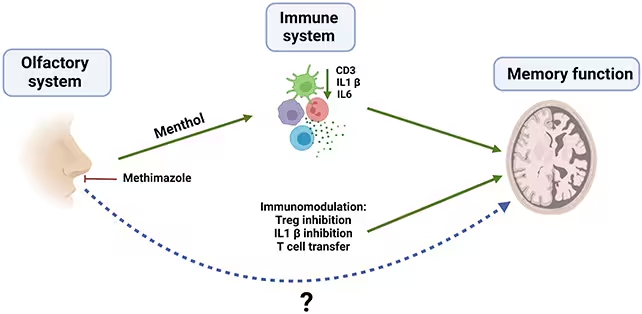4 Minutes
Exploring the Unexpected Connection Between Menthol and Alzheimer’s Disease
Recent research has revealed a surprising discovery in the field of neurodegenerative disease: exposure to menthol scent can significantly improve cognitive function in mouse models of Alzheimer’s disease. The findings, published in April 2023 by a research team at the Center for Applied Medical Research (CIMA) in Spain, suggest that certain scents, specifically menthol, may have therapeutic potential for neurological conditions like Alzheimer’s.
Scientific Background: The Olfactory System and Brain Health
The human brain’s response to smells is remarkably complex, involving both the nervous and immune systems. Our sense of smell, or olfactory function, is closely intertwined with memory, emotion, and overall cognitive health. In fact, diminished olfactory ability is often one of the early signs of neurodegenerative diseases such as Alzheimer’s, Parkinson’s disease, and certain forms of schizophrenia.
Research has shown that substances inhaled through the nose can directly affect brain chemistry, potentially influencing both neuronal and immune regulation. The new study from CIMA builds on previous work indicating that menthol acts as an immunostimulatory odor in animal models.
The Menthol Experiment: Methods and Key Findings
In their recent experiments, CIMA scientists exposed mice genetically engineered to develop Alzheimer’s disease to menthol vapors for a period of six months. The results were striking: not only did menthol inhalation halt the cognitive decline typically observed in these animals, but it also enhanced cognitive performance in healthy young mice. Laboratory tests demonstrated improvements in memory and learning tasks among the menthol-exposed groups.
A deeper look at the underlying mechanisms revealed a significant reduction in the protein interleukin-1-beta (IL-1β) in the brains of treated mice. IL-1β is known for its critical role in regulating inflammatory responses; while inflammation is a necessary self-defense mechanism, chronic or excessive inflammation has been linked to the progression of Alzheimer’s disease.

The researchers also investigated the function of regulatory T cells (Tregs), which help keep immune responses in check. When they artificially reduced Treg cell activity, they observed similar benefits to those seen with menthol exposure—namely, a drop in harmful IL-1β levels and improvements in cognitive abilities. Furthermore, blocking IL-1β using a drug commonly prescribed for some autoimmune conditions yielded enhanced memory in both healthy and Alzheimer’s-affected mice.
Expert Perspectives and Future Applications
According to immunologist Juan José Lasarte, "We have confirmed that menthol is an immunostimulatory odor in animal models and observed that short exposures over six months can prevent cognitive decline in Alzheimer’s mice, while also boosting cognition in young, healthy mice."
Neuroscientist Ana Garcia-Osta added, "Both menthol exposure and Treg cell reduction led to decreased IL-1β, which could be linked to cognitive decline in these models. This points towards new potential therapeutic pathways."
The results imply that certain odors could be harnessed to trigger beneficial immune responses, presenting a novel, non-invasive approach to treating or preventing Alzheimer’s and perhaps other central nervous system disorders. However, researchers caution that these results are preliminary and based on animal studies—extensive clinical trials in humans are required to validate if these effects translate beyond laboratory settings.
Broader Implications: The Future of Smell-Based Therapies
The evidence adds to a growing body of literature suggesting that the sense of smell might play a more fundamental role in brain health than previously understood. The use of olfactory stimuli, or even targeted odor-based therapies, could potentially become a new frontier in neuroscientific and medical interventions for Alzheimer's and related diseases.

"This study is a crucial step toward unraveling the connections between the immune system, central nervous system, and olfaction," commented immunologist Noelia Casares of CIMA. "Our results indicate that specific odors and immune modulators may play vital roles in both the prevention and treatment of Alzheimer’s and similar neurological disorders."
Conclusion
The discovery that menthol inhalation can improve cognitive function and reduce neuroinflammation in mouse models of Alzheimer’s opens up an intriguing new avenue for research into sensory-based therapies. While still in early stages, this work highlights the importance of understanding the intricate interplay between our senses, immune system, and brain health, and paves the way for innovative strategies to fight neurodegenerative diseases in the future.


Comments